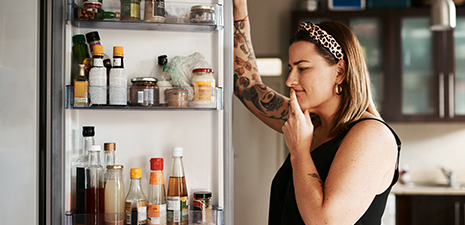Do you ever feel like weekends hold you back from your weight loss goals? Get weekend success tips from dietitian and nutritionist Nicole German Morgan.

The Link Between Sleep and Weight Loss
How’s your sleep? Do you generally wake up refreshed, energized, and excited to start your day, or do you grumpily crawl out of bed cursing the alarm clock and wishing you could sleep for another hour or two? If you answered the latter and you’re trying to lose weight, rather than following the latest fad diet, you may need to spend more time in bed.
Weight and Sleep Research
When it comes to weight loss, most people think that diet and exercise are the most important areas to focus on, but a growing body of research is showing there is a sleep/weight connection. Catching the late show or staying up to answer emails might be just as detrimental to your waistline as that extra glass of wine or serving of macaroni and cheese. Here’s what the science says:
- Being overweight or obese can disrupt sleep quality and increase the risk of disorders such as obstructive sleep apnea, a condition where soft tissue in the back of the throat interferes with breathing.1
- People who sleep more tend to be leaner. A literature review published in the journal Obesity looking at over 40 years of research concluded: “Short duration sleep appears independently associated with weight gain.”2
- The Nurses’ Health Study, which tracked 68,000 American women for 16 years, found that compared to women who slept 7 hours a night, women who got 5 hours or less increased their obesity risk by 15 percent.3
- Intervention studies have shown improving sleep can prevent weight gain and the accumulation of body fat. A 6-year study found that people who continued to sleep less than 6 hours each night increased their fat mass and body mass index (BMI) significantly more than people who changed their habits so they were sleeping 7–8 hours each night.4
- Poor sleep is associated with numerous health problems including obesity, heart disease, and high blood pressure. Inadequate sleep also affects your body’s ability to properly regulate blood sugar levels, increasing your risk of diabetes.5
People who stay up late also have additional time to eat and tend to snack more during those extra waking hours. Plus, sleep deprivation decreases the number of calories you burn each day. When you’re tired, you lack the motivation to go to the gym and are more apt to sit on the couch than take a walk.
How to Ensure You Get Enough Zzzs
While most Americans get enough sleep (the average is 7 hours and 36 minutes each night), according to the National Sleep Foundation, 35% of Americans say their sleep quality is “poor” or “only fair.”6
The good news is that there are many things you can do to improve sleep quality and quantity. Here are eight suggestions to get the 7–8 hours of rest that most of us need to feel good and support weight loss.
- Follow your circadian rhythm: Your brain has an internal 24-hour clock called your circadian rhythm that cycles between asleep and awake states. It works best with a regular schedule. To support it, create a bedtime routine: Go to bed at the same time each night at a time that allows you to get 7–8 hours of sleep. Turn off all screens (TV, phone, and computer) at least an hour prior to bed. (Stimulating media coupled with blue light from screens, which can prevent the release of melatonin, may interfere with proper sleep.) To relax, make yourself a cup of chamomile tea, listen to soothing music, read, or meditate.
- Adjust your bed and bedroom: Make sure your bedroom is dark, quiet, and cool. According to the National Sleep Foundation, a temperature of around 65 degrees is ideal. If your bed or pillows are worn out or uncomfortable, buy new ones.
- Avoid caffeine after noon: If you’re tired, it can be tempting to reach for caffeine to get through the day. However, caffeine is a stimulant that has a 6-hour halflife, which means it takes 6 hours for your body to eliminate half of the caffeine you consume. So, in the afternoon, switch to decaf and drink water instead of regular cola.
- Skip the nightcap: While you may think that a cocktail or glass of beer will help you relax and sleep, the truth is that alcohol is a depressant that disrupts your nervous system and can interfere with normal sleep later at night. If you drink, do so in moderation (no more than one drink a day for women and two for men) and have your beverage earlier in the evening.
- Eat an early, light dinner: A large, heavy, late meal can prolong digestion and interfere with your sleep. To improve bedtime sleep, eat less at dinner and finish eating at least 2–3 hours before you go to bed. If you have indigestion, avoid spicy food and foods that create gas at dinnertime.
- Have a carbohydrate-rich snack: It’s fine to have a light snack such as a little popcorn or a piece of fruit prior to bed. In fact, snacks high in carbohydrates trigger the release of serotonin, a neurotransmitter that can improve sleep.
- Exercise regularly: Not only will regular exercise help you maintain your weight and reduce stress, exercising most days for at least 20 to 30 minutes, but not too close to bedtime, will improve your wellbeing and help you get a great night of rest.
- Let worries go: If rumination is ruining your sleep, find ways to shut off your busy mind. Many techniques can help, including journaling (write down what’s bothering you earlier in the day and set it aside), relaxation exercises, learning to meditate, starting an evening gratitude practice, or focusing on positive thoughts.
Know that you are in charge of your night’s rest and can make permanent changes to improve your sleep. Not only will doing so help you lose weight, eat more mindfully, and stick to a healthy diet, you’ll also improve your productivity and overall health, mood, and wellbeing.
Rx Only. For the safe and proper use of Plenity or more information, talk to a healthcare professional, read the Patient Instructions for Use.
- Richard J. Strobel, Raymond C. Rosen, Obesity and Weight Loss in Obstructive Sleep Apnea: A Critical Review, Sleep, Volume 19, Issue 2, March 1996, Pages 104–115, https://doi.org/10.1093/sleep/19.2.104
- Patel SR, Hu FB. Short sleep duration and weight gain: a systematic review. Obesity (Silver Spring). 2008;16(3):643–653. doi:10.1038/oby.2007.118
- Patel SR, Malhotra A, White DP, Gottlieb DJ, Hu FB. Association between reduced sleep and weight gain in women. Am J Epidemiol. 2006;164(10):947–954. doi:10.1093/aje/kwj280
- Chaput, J., Després, J., Bouchard, C. et al. Longer sleep duration associates with lower adiposity gain in adult short sleepers. Int J Obes 36, 752–756 (2012). https://doi.org/10.1038/ijo.2011.110
- Knutson KL. Impact of sleep and sleep loss on glucose homeostasis and appetite regulation. Sleep Med Clin. 2007;2(2):187–197. doi:10.1016/j.jsmc.2007.03.004
- https://www.sleepfoundation.org/press-release/lack-sleep-affecting-americans-finds-national-sleep-foundation





